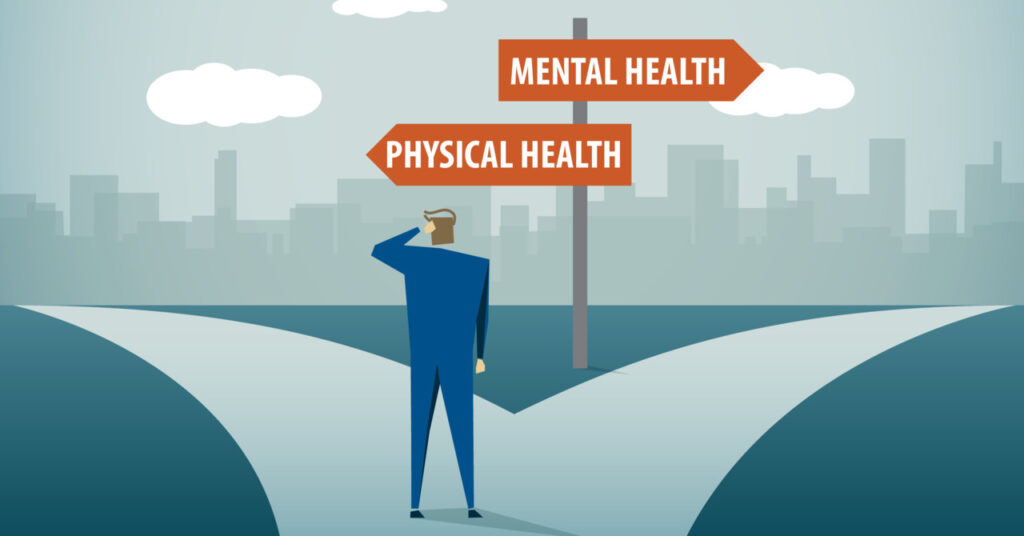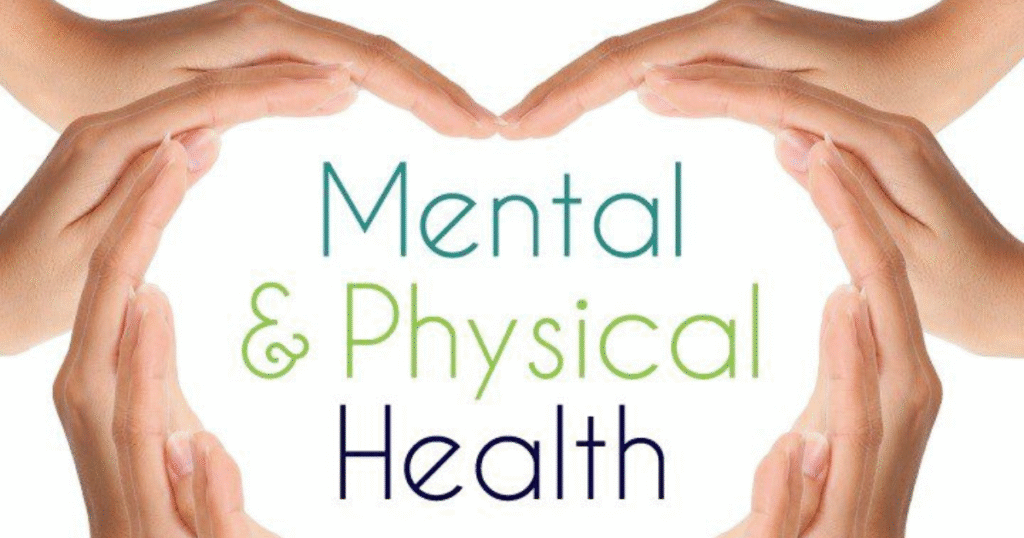Mental and physical health are often considered separate entities, but in reality, they are deeply interconnected. Your mind and body are not isolated systems; they constantly influence each other. This article explores how mental health impacts physical health, how physical health affects mental well-being, and why taking care of both is essential for overall wellness.
The Impact of Mental Health on Physical Health

Mental health refers to the emotional, psychological, and social well-being of an individual. Conditions like depression, anxiety, and stress can have significant consequences on physical health. Understanding the impact of poor mental health on the body can help raise awareness and encourage people to seek help when necessary.
1. Chronic Stress and the Body
Stress is a normal part of life, but when it becomes chronic, it can have a detrimental impact on physical health. Prolonged stress can lead to elevated levels of cortisol, the body’s primary stress hormone. High cortisol levels can cause various physical problems, such as:
- Weakened immune system: Chronic stress can impair the immune system, making the body more susceptible to infections.
- Heart disease: Long-term stress contributes to high blood pressure and inflammation, increasing the risk of heart disease.
- Digestive problems: Stress can lead to gastrointestinal issues like acid reflux, irritable bowel syndrome (IBS), and stomach ulcers.
2. Anxiety and Its Physical Symptoms
Anxiety can manifest in both emotional and physical forms. While it’s often thought of as a psychological condition, anxiety has several physical symptoms, including:
- Increased heart rate: Anxiety triggers the body’s “fight or flight” response, which increases heart rate and blood pressure.
- Muscle tension: Constant anxiety can lead to muscle tightness, especially in the neck, shoulders, and back.
- Breathing difficulties: Anxiety often causes rapid, shallow breathing or even hyperventilation, leading to dizziness and shortness of breath.
3. Depression and the Body’s Functioning
Depression affects more than just a person’s mood. It can also have a direct impact on physical health, such as:
- Chronic pain: Many people with depression experience unexplained physical pain, such as headaches, back pain, and joint pain.
- Sleep disturbances: Depression often leads to insomnia or oversleeping, both of which can have negative effects on physical health.
- Fatigue and weakness: Depression causes a lack of energy, which can lead to physical exhaustion and a reduced ability to perform everyday tasks.
The Role of Physical Health in Mental Well-Being

While mental health conditions can significantly impact physical health, the reverse is also true. Physical health plays an important role in maintaining mental well-being. When the body is healthy, it can better cope with stress, anxiety, and other emotional challenges.
1. Exercise and Mental Health
Regular physical activity has long been shown to benefit both physical and mental health. Exercise can:
- Reduce symptoms of depression and anxiety: Physical activity stimulates the production of endorphins, the body’s natural mood boosters. It also helps regulate stress hormones, such as cortisol.
- Improve sleep: Regular exercise promotes better sleep patterns, which are crucial for mental health. Adequate rest helps regulate mood and cognitive function.
- Boost self-esteem and confidence: Exercise improves physical health and can help individuals feel better about their bodies, which boosts mental well-being.
2. Nutrition and Brain Health
What we eat can have a profound effect on our mental health. A well-balanced diet rich in essential nutrients supports both physical and mental well-being. For example:
- Omega-3 fatty acids: Found in fish, flaxseeds, and walnuts, omega-3s are known to reduce symptoms of depression and anxiety.
- B vitamins: These vitamins, particularly B6, B12, and folate, play a role in maintaining brain health and regulating mood.
- Antioxidants: Foods rich in antioxidants, such as fruits and vegetables, can reduce inflammation and oxidative stress, which are linked to depression and other mental health disorders.
3. The Importance of Sleep for Mental Health
Getting sufficient and quality sleep is critical for both physical and mental health. Chronic sleep deprivation has been linked to a variety of mental health issues, such as:
- Increased risk of depression and anxiety: Poor sleep patterns can exacerbate existing mental health conditions.
- Cognitive impairment: Sleep is essential for memory consolidation, problem-solving, and emotional regulation.
- Physical health risks: Sleep deprivation weakens the immune system, increases the risk of heart disease, and impairs physical performance.
How Mental and Physical Health Are Connected

The connection between mental and physical health is a two-way street. Not only does poor mental health impact physical health, but physical illness can also lead to mental health challenges. This connection is especially evident in individuals dealing with chronic conditions.
1. Chronic Illness and Mental Health
People with chronic illnesses such as diabetes, heart disease, or cancer often face a higher risk of developing mental health issues like depression and anxiety. The emotional burden of living with a chronic condition, combined with physical limitations, can create a vicious cycle where poor mental health exacerbates physical symptoms, and vice versa.
- Chronic pain and depression: Chronic pain can make it difficult for individuals to engage in daily activities, leading to feelings of frustration, sadness, and isolation.
- Living with a chronic illness: Coping with the demands of a long-term condition can lead to feelings of helplessness, anxiety, and stress.
2. Physical Activity as a Tool for Mental Health Recovery
For individuals recovering from physical illness or injury, incorporating exercise into rehabilitation can have a positive impact on mental health. Physical activity helps release endorphins and improve mood, which can aid in overcoming feelings of sadness or despair.
- Rehabilitation and mental health: Physical recovery often requires addressing mental health challenges as well. Psychotherapy, cognitive-behavioral therapy (CBT), or support groups can be beneficial in helping patients manage their emotions and build resilience.
Also Read : The Truth About Your Health: Debunking Common Myths
Conclusion
The connection between mental and physical health is undeniable. One affects the other, and taking care of both is essential for overall well-being. Mental health challenges like anxiety, depression, and stress can lead to various physical problems, while physical health issues can worsen mental health. The key to maintaining a healthy mind and body is a holistic approach—regular exercise, a balanced diet, adequate sleep, and managing stress can all contribute to better physical and mental health.
FAQs
1. How can I improve my mental health through physical activity?
Regular exercise can boost your mood by releasing endorphins, reduce stress, and improve sleep. Aim for at least 30 minutes of moderate exercise, such as walking, cycling, or swimming, most days of the week.
2. What should I eat for better mental health?
A diet rich in omega-3 fatty acids, B vitamins, and antioxidants can support mental health. Foods like fish, nuts, leafy greens, and berries are excellent choices for maintaining a healthy brain.
3. Can poor mental health cause physical health problems?
Yes, chronic stress, anxiety, and depression can lead to various physical health issues, including heart disease, digestive problems, and weakened immunity.
4. How does sleep affect both mental and physical health?
Adequate sleep is vital for both physical recovery and mental clarity. Poor sleep can lead to irritability, anxiety, cognitive impairment, and increased risk of chronic diseases.
5. How can I break the cycle of poor mental and physical health?
Taking a holistic approach by addressing both physical and mental health simultaneously is key. Regular exercise, a balanced diet, proper sleep, and stress management techniques like mindfulness or therapy can help break the cycle.








